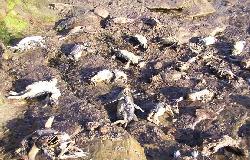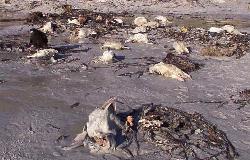| International press reports of our work to save penguins - CLICK LOGO to view article |
|
.One quarter of world's Rockhoppers might have starvedThe New Scientist 14th June 2002 - by Nicola Jones
"Something weird is going on in the Falkland's this year. The Rockhoppers haven't moulted properly and the Magellanic chicks have all starved to death," says Andrea Clausen, a marine biologist with the charity Falklands Conservation. Mike Bingham, of the Environmental Research Unit of the Falkland Islands, counted 2,067 dead adult Rockhopper penguins on Saunders Island this May - more than a quarter of that colony. It seems the adult penguins did not have enough energy to leave the islands after their moulting season, forcing them to stay on land and die of starvation. About the same number of dead birds probably washed away uncounted, Bingham estimates. If this death tally is representative of the islands as a whole, half of the Falkland's Rockhopper population - and almost a quarter of the world's - might have died. A similar mass killing happened in 1986, when the Rockhopper penguin population stood at 2,500,000 breeding pairs. By 1987, the population had halved, and it continued to decline to a total of about 300,000, about five years ago. The numbers then remained fairly stable until the recent deaths. The Rockhopper species is already classified as "vulnerable". "It wouldn't take much to push them into another category," says Andrea Clausen, a marine biologist with Falkland Conservation. A count of Magellanic penguins in the Falkland Islands in 2000 put the total at 150,000. It will take some time to establish how many chicks died this year, local biologists say. Bingham suspects that fishing in the area may be exacerbating the penguins' problems. Magellanic penguins in particular feed on commercially valuable species like squid, making them vulnerable to over-fishing. Bingham points out that Rockhopper populations in nearby Chile and Argentina, where a no-fishing-zone is in place, have not suffered in recent years the same way as the Falkland Island colonies.
|

